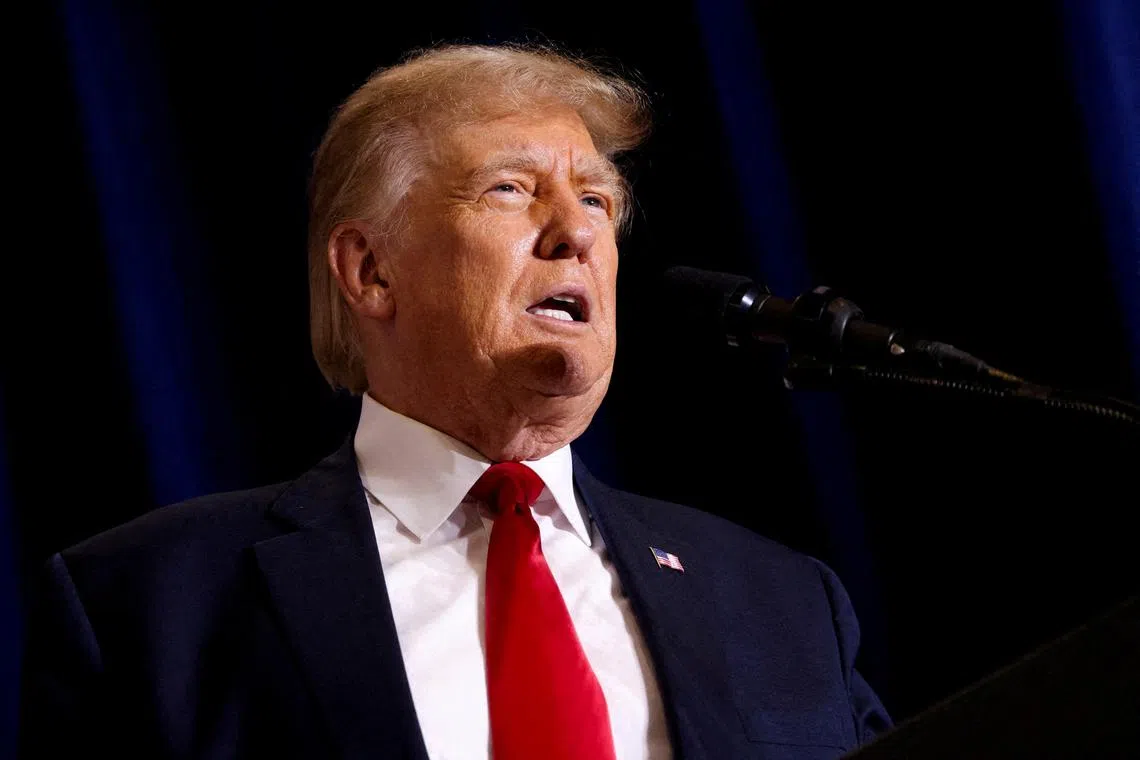What does New York fraud ruling mean for Donald Trump’s business empire?
Sign up now: Get ST's newsletters delivered to your inbox

Donald Trump is under indictment in four separate criminal cases.
PHOTO: REUTERS
Follow topic:
NEW YORK – The fate of Donald Trump’s business empire hangs in the balance after a New York judge stripped control of key properties from the former US president as punishment for his “repeated and persistent fraud” over their valuations.
Here is a look at the ruling and its implications for Trump, the front runner for the 2024 Republican presidential nomination.
What does the ruling say?
Democratic New York Attorney-General Letitia James filed a civil lawsuit against Trump, his adult sons and nearly a dozen business entities in September 2022, alleging they inflated the value of their assets by billions of dollars to secure more favourable loan and insurance terms.
Justice Arthur Engoron of New York state court in Manhattan ruled on Tuesday that Trump and his co-defendants committed fraud and ordered the cancellation of certificates that some of Trump’s businesses need to operate in New York.
The judge added that he would appoint independent receivers to manage the dissolution of the cancelled certificates.
The order did not provide a timeline for the cancellations. Judge Engoron asked the parties to recommend potential receivers within the next 30 days.
Trump has denied wrongdoing and said the case is part of a political witch hunt.
What does the ruling mean for Trump’s business?
The immediate impact of the ruling is unclear, as Trump’s holdings comprise a network of roughly 500 entities spanning real estate, licensing and other business ventures.
The ruling covers 10 Trump entities but includes pillars of Trump’s empire, including his commercial property at 40 Wall Street in Manhattan, a golf resort in Scotland and Mar-a-Lago resort in Palm Beach, Florida.
Independent receivers could continue to operate the properties as businesses or liquidate them, though Trump would likely be entitled to the proceeds of any sale, legal experts said.
Judge Engoron declined to answer whether the assets would be sold or simply managed by an independent receiver when asked by one of Trump’s lawyers during a hearing on Wednesday, saying he would rule on that question later.
What comes next in the case?
Trump’s lawyers said they would appeal the decision, which they described as an “outrageous” attempt to “nationalise one of the most successful corporate empires in the United States and seize control of private property”.
Trump could also seek a stay or pause of the court’s order pending appeal, which would likely be met by a request from Ms James to block any asset transfers while the case plays out.
A trial is scheduled to begin on Monday. Because of Judge Engoron’s fraud ruling, it would largely be limited to how much Trump and his co-defendants must pay in penalties.
Ms James is seeking at least US$250 million (S$343 million) and has asked the court to permanently bar Trump from serving as an officer or director of any business in New York, and prohibit him from acquiring any real estate or applying for a loan in the state for five years.
Ms James is seeking the same restrictions for Trump’s two adult sons, Donald Jr and Eric.
Could Trump face criminal penalties?
Not in this case, which is civil. But Trump is under indictment in four separate criminal cases.
He has been charged in Florida for his handling of classified documents upon leaving office; hush money payments he made to a porn star.
Trump has pleaded not guilty in all four cases. REUTERS

